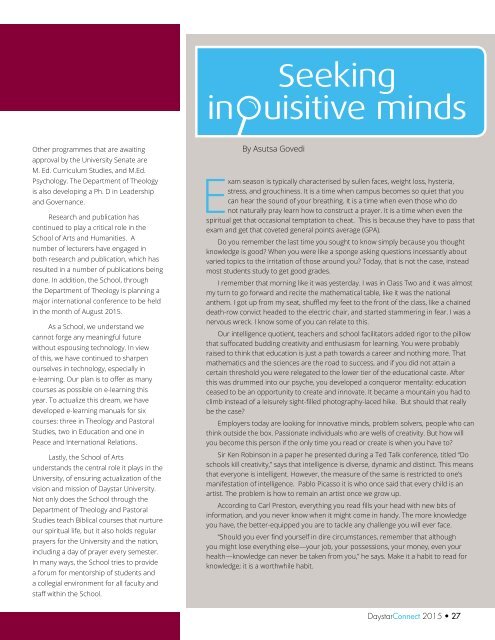our roots
Connect2015
Connect2015
Create successful ePaper yourself
Turn your PDF publications into a flip-book with our unique Google optimized e-Paper software.
Seeking<br />
in uisitive minds<br />
Other programmes that are awaiting<br />
approval by the University Senate are<br />
M. Ed. Curriculum Studies, and M.Ed.<br />
Psychology. The Department of Theology<br />
is also developing a Ph. D in Leadership<br />
and Governance.<br />
Research and publication has<br />
continued to play a critical role in the<br />
School of Arts and Humanities. A<br />
number of lecturers have engaged in<br />
both research and publication, which has<br />
resulted in a number of publications being<br />
done. In addition, the School, through<br />
the Department of Theology is planning a<br />
major international conference to be held<br />
in the month of August 2015.<br />
As a School, we understand we<br />
cannot forge any meaningful future<br />
without espousing technology. In view<br />
of this, we have continued to sharpen<br />
<strong>our</strong>selves in technology, especially in<br />
e-learning. Our plan is to offer as many<br />
c<strong>our</strong>ses as possible on e-learning this<br />
year. To actualize this dream, we have<br />
developed e-learning manuals for six<br />
c<strong>our</strong>ses: three in Theology and Pastoral<br />
Studies, two in Education and one in<br />
Peace and International Relations.<br />
Lastly, the School of Arts<br />
understands the central role it plays in the<br />
University, of ensuring actualization of the<br />
vision and mission of Daystar University.<br />
Not only does the School through the<br />
Department of Theology and Pastoral<br />
Studies teach Biblical c<strong>our</strong>ses that nurture<br />
<strong>our</strong> spiritual life, but it also holds regular<br />
prayers for the University and the nation,<br />
including a day of prayer every semester.<br />
In many ways, the School tries to provide<br />
a forum for mentorship of students and<br />
a collegial environment for all faculty and<br />
staff within the School.<br />
By Asutsa Govedi<br />
Exam season is typically characterised by sullen faces, weight loss, hysteria,<br />
stress, and grouchiness. It is a time when campus becomes so quiet that you<br />
can hear the sound of y<strong>our</strong> breathing. It is a time when even those who do<br />
not naturally pray learn how to construct a prayer. It is a time when even the<br />
spiritual get that occasional temptation to cheat. This is because they have to pass that<br />
exam and get that coveted general points average (GPA).<br />
Do you remember the last time you sought to know simply because you thought<br />
knowledge is good? When you were like a sponge asking questions incessantly about<br />
varied topics to the irritation of those around you? Today, that is not the case, instead<br />
most students study to get good grades.<br />
I remember that morning like it was yesterday. I was in Class Two and it was almost<br />
my turn to go forward and recite the mathematical table, like it was the national<br />
anthem. I got up from my seat, shuffled my feet to the front of the class, like a chained<br />
death-row convict headed to the electric chair, and started stammering in fear. I was a<br />
nervous wreck. I know some of you can relate to this.<br />
Our intelligence quotient, teachers and school facilitators added rigor to the pillow<br />
that suffocated budding creativity and enthusiasm for learning. You were probably<br />
raised to think that education is just a path towards a career and nothing more. That<br />
mathematics and the sciences are the road to success, and if you did not attain a<br />
certain threshold you were relegated to the lower tier of the educational caste. After<br />
this was drummed into <strong>our</strong> psyche, you developed a conqueror mentality: education<br />
ceased to be an opportunity to create and innovate. It became a mountain you had to<br />
climb instead of a leisurely sight-filled photography-laced hike. But should that really<br />
be the case?<br />
Employers today are looking for innovative minds, problem solvers, people who can<br />
think outside the box. Passionate individuals who are wells of creativity. But how will<br />
you become this person if the only time you read or create is when you have to?<br />
Sir Ken Robinson in a paper he presented during a Ted Talk conference, titled “Do<br />
schools kill creativity,” says that intelligence is diverse, dynamic and distinct. This means<br />
that everyone is intelligent. However, the measure of the same is restricted to one’s<br />
manifestation of intelligence. Pablo Picasso it is who once said that every child is an<br />
artist. The problem is how to remain an artist once we grow up.<br />
According to Carl Preston, everything you read fills y<strong>our</strong> head with new bits of<br />
information, and you never know when it might come in handy. The more knowledge<br />
you have, the better-equipped you are to tackle any challenge you will ever face.<br />
“Should you ever find y<strong>our</strong>self in dire circumstances, remember that although<br />
you might lose everything else—y<strong>our</strong> job, y<strong>our</strong> possessions, y<strong>our</strong> money, even y<strong>our</strong><br />
health—knowledge can never be taken from you,” he says. Make it a habit to read for<br />
knowledge; it is a worthwhile habit.<br />
DaystarConnect 2015 • 27


